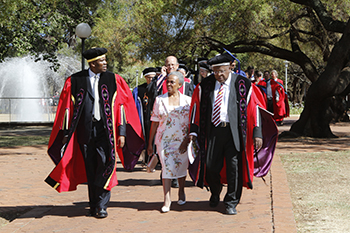
Procession frontline: seen making their way to the graduation ceremony are from left: Dr Khotso Mokhele (Chancellor of the UFS), Prof Busisiwe Bhengu (Chairperson of the South African Nursing Council), and Prof Jonathan Jansen (Vice-Chancellor of the UFS).
Photo: Johan Roux
|
The time for one-dimensional discourse was over, said Professor Busisiwe Bhengu, the guest speaker at this year’s Summer Graduation. Practical implementation of change was the step forward in forging the path into a brighter South Africa future.
During both the morning and afternoon ceremonies held at the University of the Free State (UFS) Bloemfontein Campus on 10 December 2015, the Chairperson of the South African Nursing Council, and Associate Professor at the University of KwaZulu-Natal, challenged the newly-graduated alumni to rise to the occasion, and be a part of the solution to our country’s diverse challenges.
Some of the pervasive hardships she highlighted were human immunodeficiency virus (HIV) and tuberculosis (TB), the escalating number of orphans and child-headed households, and the human resource shortages resulting from an ageing generation which is exiting the employment system through retirement.
Prior to dissolving the congregations, Dr Khotso Mokhele, the Chancellor of the UFS, said: “I was caught by the leadership challenge she [Prof Bhengu] threw out at the graduates because we indeed need courageous, creative and innovative leaders moving forward,” he said.
Dr Mokhele touched on South Africa’s dwindling economy, the leadership issues engulfing the government currently, the #FeesMustFall movement, and how students led a difficult dialogue and dictated the country’s trajectory as regards education, as well as the water scarcity we are facing. In closing, he warned that the graduates had lost the luxury of feeling led because of the fact that they now have a leadership obligation to fulfil.
Highlights of the day
Amongst 102 graduates from the UFS School of Medicine were two brothers from the Free State, Johann and Rudi Westraad who followed each other’s passion to become doctors.
Deputy Registrar at the UFS, Elna Van Pletzen, graduated with a Master’s in Higher Education Studies. Her thesis titled ”The implications of current legislative changes for academic freedom and institutional autonomy of South African higher education institutions”, focused on the amendment of Higher Education and Training Laws Amendment Act of 2012. In it, she tackled the subjects of academic freedom and the relationship between government and higher education institutions. Coincidently, her research was produced at a time when the subject of university autonomy was on the national agenda.
The occasion was not only a celebration of the students; teachers were also recognised for their dedication to quality education. Prof Jonathan Jansen, Vice-Chancellor and Rector of the UFS congratulated Dr Louise van den Berg (Faculty of Health Sciences) as well as Naquita Fernandes and Salomien Boshoff (both from the Faculty of Economic and Management Sciences) for their outstanding achievements. At a recent ceremony, Dr Van den Berg received the Vice-Chancellor’s Award for an individual teacher, and the Vice-Chancellor’s Award for the best teaching team was presented to Fernandes and Boshoff.